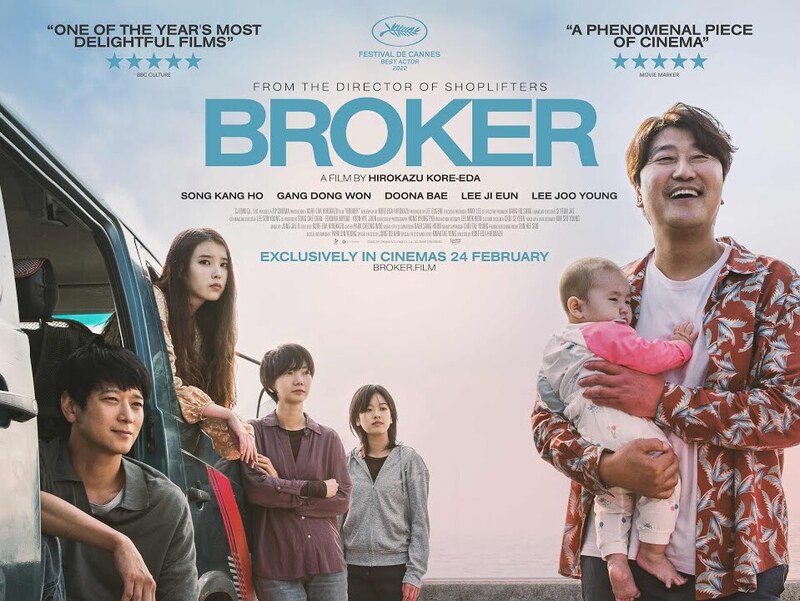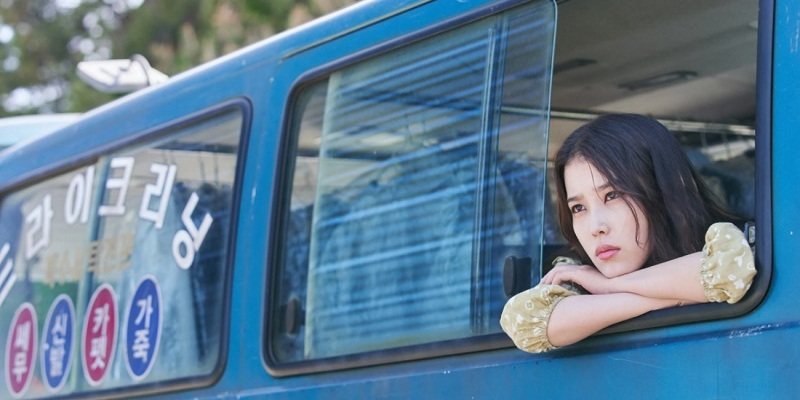
Review by
Eric Hillis
Directed by: Hirokazu Kore-eda
Starring: Bae Doona, Gang Don-won, Lee Ji-eun, Song Kang-Ho, Lee Joo-young

I was shocked to read that writer/director
Hirokazu Kore-eda only discovered – and subsequently fell in love
with – the films of John Ford while at a loss during the pandemic. While
Kore-eda's work is clearly influenced by his compatriots Ozu and Naruse,
I've always considered him the modern heir to Ford's considered, subtle,
yet infinitely illuminating style of filmmaking. Before learning of
Kore-eda's prior ignorance of his American predecessor, I imagined
Broker might be his 3 Godfathers. Unfortunately it has more in common with
Three Men and a Baby. Broker is the sort of movie you could imagine Hollywood
remaking, were its central starting point not so culturally specific to
South Korea, where Kore-eda finds himself working for the first time
after a stint in France with
The Truth.

That cultural specificity concerns the South Korean phenomenon of "baby
boxes," slots in the walls of churches where mothers can anonymously
drop off their unwanted infants. So-young (Lee Ji-eun) is one
such mother. Barely out of her teens, we find her leaving her baby
outside a church, though for some unexplained reason she drops the kid
on the ground rather than placing him in the box, an odd move
considering it's such a rainy night. It's the first of several puzzling
moments in a film that really could have done with a few more passes at
a script that plays like a rough early draft.

Unbeknownst to So-young, the baby ends up in the hands of child
traffickers Ha Sang-hyeon (Song Kang-ho) and Dong-soo (Gang Dong-wan). With the latter working the night shift at the church, the two men
run a scheme where they nab infants left during the night and sell them
on the black market to prospective parents who wish to avoid official
channels. That might make them sound like two of the worst humans on the
planet, but Kore-eda sure doesn't see it that way. In the filmmaker's
usually skilled hands (sadly all thumbs here), Sang-hyeon and Dong-soo
are loveable rogues, painted as the most sensitive characters in the
entire film. When they agree to split the profits with So-young, who
rumbles their nefarious scheme, the three set off on a road trip to find
parents who can not only pay the amount required to clear Sang-hyeon's
gambling debts but that also tick the boxes So-young requires of her
kid's new mum and dad.
While the trio searches for suitable parents, the film similarly
struggles to find its footing. Kore-eda can't settle on a tone for his
movie. Much of the antics involving the central trio play like a damp
version of a broad '80s Hollywood comedy – you might imagine the
traffickers played by Danny DeVito and Judge Reinhold – and Kore-eda
sets up comic situations that he then fumbles through his inexperience
of this sort of mainstream fare. An attempt to generate suspense comes
in the form of a pair of detectives (Bae Doona, Lee Joo-young) on
the trail of the trio, along with gangsters looking to collect on
Sang-hyeon's debts. We're never given a valid reason why we should be
rooting for our nominal heroes as opposed to the authorities chasing
them, and no amount of kissing babies by Sang-hyeon and Dong-soo can
make us forget that they're selling kids on the black market.
Conversely, Kore-eda paints a sinister picture of the world of
prostitution So-young has escaped from. Regardless of your views on sex
work, I'm sure you agree it pales in comparison to child
trafficking!

Kore-eda just can't seem to grasp the darkness at the heart of his
fable. There are a couple of murders in the movie that are ultimately
meaningless, dispensed with quickly as we return to the maudlin central
narrative. There are several Korean filmmakers that you could imagine
mining this scenario for black comedy in a far more effective manner
than Kore-eda manages here, which makes you wish he had collaborated
with a local writer on his Korean debut. It's ironic that Kore-eda was
able to work in France and maintain his style, but working in the
country next-door he comes off as completely foreign. What could have
been a
Parasite-esque blackly comic thriller that shines a light on the darker side of
Korean society is instead a pale imitation of the Japanese films of
Kore-eda, who this misstep aside is arguably the greatest filmmaker of
his generation. Like John Ford, Kore-eda is a master of summing up big
ideas through small gestures, but with Broker he gets lost
in a rambling plot that ultimately has very little to say beyond trite
homilies about the nature of family. To see this sort of thing done
well, watch any of Kore-eda's Japanese films; you may feel you're
watching the work of an entirely different filmmaker.


